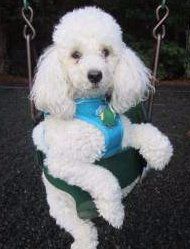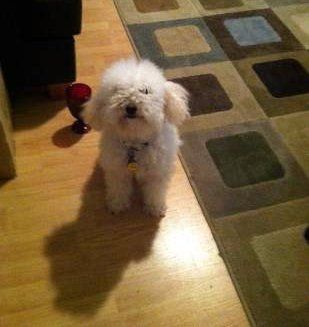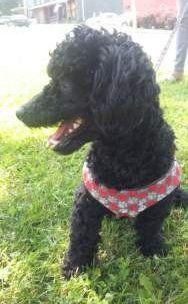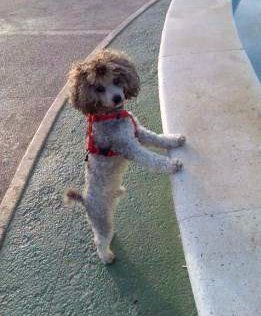Call us: 555-555-5555
Exercise
Poodle Exercise Requirements
Overview
Exercise plays a crucial role in a dog's overall health and can even extend a dog's life span. Offering proper exercise goes way beyond taking a Poodle out for a walk now and again. To meet needed requirements, you'll need to look at:
- Duration
- Frequency
- Pace / Level of exertion
Offering the right amounts of these elements is important; though over-exercising is a concern as well. This section will make sure that you know how to find the right balance of activity for a Poodle of each variety (Toy, Miniature and Standard) and of any age.
We will go over:
- How your Poodle will benefit from scheduled activity
- What type of exercise is best for this breed, for each size variety
- Exercise requirements for all stages of a Poodle's life
- How to overcome the most common reasons for not exercising your dog
- Alternative activities you can do with your puppy or dog
- 6 Top Exercise Tips
- Reader Q&A
Why Exercise is So Important
When a Poodle receives enough proper exercise, the benefits are enormous.
Physical Health
- When a dog is exercised on a regular basis, it helps keep him/her physically healthy in a multitude of ways, including:
- Increases blood circulation, which in turn decreases a dog's risk of cardiovascular diseases
- Helps maintain proper muscle tone, which can in turn cut down on injury
- Is great for digestion; helps prevent constipation
- Can help prevent canine diabetes and reduce the odds of stroke and even some cancers
- Increases bone strength; bone is living tissue that responds to exercise by becoming stronger
- Decreases odds of UTI's (Urinary Tract Infections); this is due to exercise stimulating urination which in turn helps to rid the body of unhealthy bacteria.
- Can help slow the development of arthritis
- Can increase life span, as diet, exercise, dental care and living conditions are the top 4 elements that affect how long a dog lives.

Charlie, 1 and 1/2 years old
Photo courtesy of Diana Panzarino
Behavioral Health
- Making sure that your Poodle meets exercise guidelines will ensure that you have a more well-behaved dog as well. In many cases, just sticking to a walking schedule can combat some of the most difficult behavioral problems.
For each of these elements, it is simply a matter of allowing a Poodle to release built-up energy and frustration in a healthy way. If exercise is done randomly and without structure, you won't see much improvement. However, when you follow a strict schedule, it can reduce or eliminate:
- Aggression/irritability - Poodles can develop the canine equivalent of cabin fever; dogs that are allowed to release tension via moderate exercise are often much calmer once back at home.
- Destructive behavior - Without regular release of energy via healthy, purposeful activity, a Poodle of any age may instead focus his energy on chewing, digging, scratching or other destructive behaviors.
- Barking - One of the main causes of excessive barking
is frustration and exercise can help eliminate this element.
- Attention seeking behavior - Dogs that miss out on regular one-on-one time with their owners can end up constantly seeking attention. However, when this need is met, the dog can relax at home, knowing that another session is due to happen soon.
It can also lead improvements in:
- Sleep - Dogs that routinely exercise sleep better at night, both in how long they sleep and how much REM (deep sleep) they receive. Just a slight case of sleep deprivation that snowballs as the days and weeks pass by can cause all sorts of behavioral issues. This can be resolved with proper exercise.
- Overall mood - With tension and frustration released in a healthy way, half the battle is done. The other part is mental stimulation... Dogs are happier when they routinely can 'be dogs'; they are happiest when they can smell scents and see sights other than what is inside the house. This creates more of a calm, relaxed mood
when indoors.
Social Health
- An often overlooked yet important part of a Poodle having the right amount of exercise is how it will improve his ability to be well-socialized.
When done correctly, regular exercise will:
- Teach socialization- One of the most crucial aspects of raising a dog to be tolerable of other animals, people and situations is to expose him to the outside world on a regular basis. Many owners of Poodles that act hyper
toward cars, dogs and people will avoid taking the Poodle out for a walk; yet this is the very thing that will lead to the Poodle learning to behave (more ahead). In time, regular outdoor activity will allow a dog to gain the experience needed to have self-confidence while out and about.
- Increase bonding - Taking the time to exercise your Poodle will also strengthen the owner/dog relationship. This is particularly true when you use this time to work on Heeling techniques. Regular walks with you gives your Poodle a 'job' and taking this on as a team each day can greatly improve the relationship between owner and dog.

PooPoo, 3 years old
Photo courtesy of Charles & Denise
To Summarize
- Now that we know that making sure your Poodle meets his exercise requirements will keep him healthy, better behaved and a more content dog, there are very few exceptions that would lead an owner to not provide this. Just as you make sure that your Poodle eats super healthy foods, you puppy proof the house to keep him safe, you brush his teeth to prevent tooth decay
and you work hard to keep him well-groomed… exercise should be a non-negotiable element of caring for your Poodle.
The Best Exercise for a Poodle
While quick bouts of energy filled activity like playing fetch does have its place, for daily exercise, walking your Poodle is the way to go. This holds true for tiny toy Poodles, medium sized Minis and large Standards.
It is the best type of exercise for this breed for several reasons:
1) It is low impact.
When your Poodle will be performing an action daily and essentially forever, you want that activity to offer all of the benefits without putting undue stress on the body. Repeated strenuous exercise puts stress on the joints, overtaxes muscles and can cause injury.
2) It can be adjusted as needed.
Once you fall into a routine of walking your Poodle often enough and for long enough periods of time(more ahead), his cardiovascular health, stamina and muscle strength will gradually improve… as this happens, walking speed can be incrementally increased so that your Poodle receives the same amount of body conditioning.
3) It is easy to do.
The only things that you will need is a leash and harness (more ahead) and some patience if your Poodle needs some practice to keep his behavior in line (more ahead). Also, with few exceptions, you can walk a dog during any season (we will discuss winter, rain, heat, etc. in just a bit).
***
In regard to toy Poodles, some owners question if walking really does equal a good workout because the toy Poodle is so tiny… those little legs can only carry them so far… does this really help? We must remember that the expenditure of energy is proportional to a person's/ dog's size. In other words, while you may be walking very slowly, if your toy Poodle is trotting along beside you at a moderate pace, your dog will be receiving moderately challenging exercise in comparison to your stroll.

Scarlett, 2 years old
Photo courtesy of Dorothy
How Much Exercise a Poodle Needs
Puppies
- For toys and miniatures under 1 year old and standards under 18 months old, owners must carefully schedule exercise times. Offering quick bouts of outdoor walking is a great way to for the puppy to discharge their abundant energy.
That being said, greatly exceeding exercise limits for puppies can be detrimental to their growth.
Why? During the first year for toys and miniature Poodles (and until about 18 months old for standard Poodles), the bones are still forming and growing. At the end of all major bones are growth plates; these are soft areas that contain rapidly dividing cells that are instrumental in allowing the bones to develop and grow longer as the Poodle pup matures from puppy to adult.
Once a Poodle is done with puberty and is officially an adult dog that is done growing, the plates harden and calcify. Until that time, over-exercise can cause injury to this soft bone tissue and interfere with normal bone growth.
So, you'll want to find a balance of enough walks, for the proper duration, to allow the pup to release energy and start becoming socialized to the world, yet be careful to not exercise your Poodle puppy to such an extent that it could possibly harm those growth plates.
Do keep in mind that normal play in the house, etc. is expected and a puppy needn't be crated to keep him from moving around! Over-exercise relates to repetitive actions such as running, walking briskly, etc. for an extended amount of time… It is important that a puppy romp around to his heart's desire… when he gets tired, he will rest. You just never want to push a young puppy into activity that puts stress on the body and raises the heartbeat if he is not up to it.
In looking at these guidelines, we must remember that the duration is the same, no matter the size of the dog. This is because it is the pace at which the dog moves that equates a state of exercise. Toys will trot and standard Poodles will trot, and it is the owner that will need to adjust the pace at which they walk to keep the dog going briskly.
A good rule of thumb is: 5 minutes per day, for each month of age. Here is a quick reference of recommended exercise times:
3 months old = One 15 minute walk each day
4 months old = Total of 20 minutes; this can be two 10 minute walks
5 months old = Total of 25 minutes; split into two walks
6 months old = Total of 30 minutes; split into three 10 or two 15 minute walks
7 months old = Total of 35 minutes; divided into two sessions
8 months old = Total of 40 minutes; best if done in three sessions (15, 15 and 10 minutes)
9 months old = Total of 45 minutes; best if done in three sessions (15, 15, 15)
10 months old = Total of 50 minutes; best if done in three sessions (20, 15, 15)
11 months old = Total of 55 minutes; best if done in three sessions (20, 15, 20)
For standards only, 12 months through 23 months = Continuation of 55 minutes (20, 15, 20). Toys and minis will at this point, move ahead to adult exercise requirements.
You'll want to go at a moderate pace that is not overwhelming. Young puppies
are only starting to learn about how to walk on leash and it can take some time for them to focus on proper heeling. Ahead, we'll dive into tips to making walking a more pleasant experience coming up.
Adults
- An adult Poodle in his prime, 1 year old (toys) or 2 years old (standards) to 7 years old, should have 60 minutes of exercise per day. Do keep in mind that no matter how active a dog appears while inside the home, this does not decrease the amount of time that the dog should be walked. There will be days that your schedule simply does not allow this or days when weather is so severe that you'll need to offer alternatives; however those should be the exceptions.
Most Poodles do best with those 60 minutes split up into two 30 minute or three 20 minute sessions. We recommend:
- Morning - If you will be leaving for the day, it's a good idea to exercise your Poodle before you leave.
- Early evening - When you arrive back home, the two most important things to do will be to bring your Poodle to the bathroom area outside and then take him for a walk to release the built up tension that developed while the dog was home alone.
- Two hours later - Once dinner has been served, some household chores have been done and you are thinking about possibly relaxing for the night, this can be a great time to go for the 3rd and last walk of the day, should you decide to do 3 walks per day instead of 2. While you won't want to exercise your Poodle right before bedtime, heading out for a quick jaunt about 2 hours before the expected sleep time can help your dog calm down and relax as the family settles in for the night.

Scotland, 10 months old
Photo courtesy of Marlyn
Seniors
- Do not make the mistake of assuming that an older dog doesn't need exercise. Unless a senior Poodle has health conditions that prohibit him from exercising, you'll want to continue with daily walks. Some owners feel that a senior Poodle
is more than content resting around the house. And while seniors are often complacent…they've seen it all and have done it all… and not much may excite them… Being out in the fresh air and stretching their legs can put a little pep in another wise ho-hum step.
Regular light exercise can relieve joint discomfort that is common with older dogs, helps the senior dog maintain muscle mass and offers all of the benefits that it does with a senior dog's younger counterparts.
Osteoarthritis is not uncommon for senior Poodle; though light exercise can often help alleviate symptoms and this will be something that you'll want to speak with the vet about. You'll want to monitor the older dog to see how he deals with duration, cutting back as needed or slowing down the pace.
Health Exceptions
- There are some health conditions, of course, that will necessitate a cease in exercise and others that require certain exercise as part of the treatment program. A good example of this is luxating patella (slipped kneecap). During recovery, strict bed rest is often prescribed along with medications to reduce swelling and help with pain. However, afterward many vets will suggest strengthening exercises, most notably walking the dog uphill, to help build muscles that surround the knees. Always check with your Poodle's vet during and after any health issue for exercise restrictions and instructions.
Pregnancy
- In general, healthy pregnant Poodles should be taken for walks and exercised as normal up until the last week of pregnancy. Easy yet consistent exercise during pregnancy helps a female dog stay well-toned which is believed to help with labor and delivery. In most cases, exercise can gradually resume 2 to 3 weeks after giving birth.

Lolo, 7 years old
Photo courtesy of Lisa
Proper Walking Pace
The goal will be to walk at what is a brisk pace for your Poodle. Depending on the age and size of your Poodle, this may simply be a casual stroll for you. With toy Poodles, do not expect to get in your cardio while walking the dog (however, the fresh air, sunshine and movement will be beneficial to you as well… studies show that time NOT spent sitting is as important as exercising and that walking slow is much better than being sedentary).
The average dog walks about 1 mile in 25 minutes and adult standards may reach this pace with ease; with the tiny toy Poodle, you can expect to cover 1/2 of a mile in 20 minutes. Take note of how your dog's legs are moving… He should be at a trot, with a short stride.
Overcoming Reasons for Not Walking Your Poodle
There are quite a few reasons why owners may be reluctant to take their Poodle out for regular exercise. Here we will discuss some of these concerns and how to deal with them.
1) My Poodle barks and acts out of control when I try to walk her.
If your Poodle acts a tad crazy when you try and walk him/her, you're not alone. However, avoiding walks will not help resolve the issue. Many dogs will bark madly at anything that's within their line of sight… people, other dogs, cars, birds, squirrels, etc. The key to all of this is that a dog reacts that way when the element is intriguing or if it gives the dog concern. And both of those attitudes will fade more and more as the dog is exposed to the elements.
If you've ever seen a dog barking like mad when being walked, if you could fast forward 6 months (and the owner consistently kept taking the dog out along the same route that whole time), you'd see a very different dog. That dog would be socialized to every aspect of the outside world and those perceived threats would no longer cause alarm.
The best thing to do is to ignore the barking (and your neighbors that are giving you funny looks) and with your Poodle safely on a harness (not a collar) and the leash kept short, keep walking at the set pace. Walk with determination and without pause, no matter how hyper your dog acts... with the harness, you won't hurt him as you continue on, ignoring his vocalization. Any time that the barking stops (for even just a count of 5 if it is severe), give enthusiastic praise while simultaneously reaching into your pocket to dispense a small treat as you continue on the path.
2) I worry about walking my Poodle in the hot summer heat.
Exercising in hot, humid weather is certainly a concern for this breed and for all dogs. However, with some planning, you can continue to make sure that your Poodle stays active enough during the summertime. Here are some tips:
- Protect the paws from hot pavement. Far too many dogs have their paws scalded by hot pavement and this can easily be fixed by either using a super high quality paw wax that will create a layer of protection or by placing comfortable doggie shoes on your Poodle.
- Protect the nose from sunburn (this can happen within 20 minutes with direct sun) which can lead to peeling. Use a quality nose balm.
- Avoid going out during the hottest part of the day. Even on exceedingly hot days, early morning and then again right before sunset, the temperature can often be in the 70's or low 80's which is tolerable. Not to mention, the sun's rays will not be as strong.
- Bring along water and plan one break. At just about the halfway point, take a break preferably in the shade. During the break, offer a good amount of cool water to your Poodle (a canine travel water container works well… the cover works as a bowl and you can place a couple of ice cubes in the insulated thermos to keep the water cold).
Do always use caution; if you feel it is just too hot out to safely walk your Poodle, look to alternative activities (more ahead).
3) During the winter, it's just too cold and snowy out to take my Poodle for walks.
While there are exceptions, walks during the winter can be doable if you plan ahead. For 'normal' winter days, here are some tips:
- Protect the paws from winter elements. The freezing ground and/or ice melt chemicals can lead to dry, peeling paws and adding protection also helps a Poodle feel more comfortable. Use a quality paw wax or slip on no-skid canine booties.
- Dress appropriately. This is important advice for both you and your Poodle. When an owner is freezing and miserable, they will be much more likely to rush the walk, take a short cut or skip it all together by rushing back inside after the dog goes to the bathroom. If you bundle up (we're talking hat, scarf, thick winter coat, gloves and durable water-proof boots), you'll be much more apt to stick with your Poodle's exercise program. Likewise, particular for toy Poodles, owners often need to take steps to help the dog stay warm. A thick lined vest, hoodie, coat or sweater will help your toy Poodle keep his core body temperature warm and toasty.

Sophie, 9 months old
Photo courtesy of June Nelligan
- Protect the nose - Cold air and whipping chilly winds can quickly cause a chapped nose. Be pro-active in protecting your Poodle's nose
before chapping happens. Use a dab of quality nose butter.
Depending on the weather, and the safety of the road conditions, you may need to take a shorter route or limit the time spent outdoors. Of course, during blizzards or a severe weather event, staying inside is the safe option.
4) My toy Poodle is very small (just 4 pounds) and I think he gets enough exercise just running around the house.
While some dogs are super active in the house, most do need to have scheduled walks. When veterinarians suggest exercise guidelines, this is taking into account that a dog is going to be moving about the house. By heading outside, you will accomplish many things: You'll know that your dog is meeting the requirements of up to an hour of exercise per day. It is also an opportunity to socialize your dog, work on heeling and spend quality time together.
Alternative Activities
Maybe it is pouring cats and dogs outside, a blizzard is blowing in, or it's 100 degrees out… no matter what may be the case, you may be looking for ways to keep your Poodle active if a walk is out of the question.
Here are some tips:
1) Summer Tips:
If it is the summer heat that is getting in the way, setting up a kiddie pool in a shaded area of the yard can be just the trick to get a dog moving. As with most activities, your enthusiasm will play a role in how much fun your Poodle has. Another great option is to set up a sprinkler. Most dogs love the thrill of chasing after osculating water and this can be a great way to offer a bit of cardio in the summer.
Lastly, swimming is a great exercise that puts very limited stress on the body… However, do keep in mind that not all Poodles automatically know how to swim well. While the Poodle was bred to be a water dog, retrieving fowl from lakes and ponds, that was quite a while ago and today's modern Poodle may need practice to feel comfortable in water. Stay super close to your dog … and using a canine life vest is always a good idea. After swimming, be sure to shampoo
and rinse the coat well, as any chlorine residue can cause excessive dryness as well as discoloration of the coat.
2) Indoor Exercise:
Nothing beats a brisk walk, however playing a rousing game of fetch or Hide n' Seek inside (or outside) can be enough to qualify as exercise as long as you keep the pace going well and time the session. Hiding a treat and getting excited about your dog trying to find it can be a great alternative to walks because it not only gets a dog in motion, it also satisfies his/her urge to sniff and seek out food. Make it more challenging as your Poodle catches on, following him about the house to keep him on track and keep him moving. For fetch, all you need is a long hallway and a ball.
As we mentioned above, your attitude and level of eagerness will play a huge role in how receptive your Poodle is and how much energy the dog puts into playing.
Top 6 Exercise Tips
1) Make a schedule. Life can be exceedingly busy and there will be times that you come home exhausted and see your Poodle is perfectly content cuddling on the sofa with you while you watch TV.
However, when you have times blocked off for taking your Poodle out for walks, it's easier to stick with the program.
2) Don't assume that your Poodle doesn’t need walks.
Maybe your Poodle behaves just fine (no pent-up energy) and is more than happy to hang around the house… so why bother? Exercise is important for 'now' and for 'later'. From keeping bones strong… to fending off diabetes and keeping the heart strong… making sure that your Poodle exercises is an investment in his/her lifespan. Every session works toward building a stronger, healthier dog.
3) Have each walk be a lesson.
These short bouts of activity can be training times as well. Whether it is to get your Poodle so used to other dogs that he learns to calm down… or you want to gradually get him to no longer fear traffic… or you want to teach the "Heel' command until your Poodle marches like a little trooper by your side… Make each walk have more meaning by working toward a goal together.

Teaka, 4 years old
Photo courtesy of Rolande and Dan
4) Assess and adjust.
Throughout your Poodle's life, his exercise requirements will change. As he builds endurance, you may need to pick up the pace. If the weather is hotter than you expected, you may need to cut the walk short and schedule it for later in the day. As a senior, he may need 3 shorter walks as opposed to two longer ones. Always be mindful of how your dog is handling the activity and make adjustments as needed.
5) Always use a harness.
It cannot be overstated how vital it is to have your Poodle wearing a harness any time that he is on leash. If a leash is connected to the collar, this places stress on the neck which can cause injury, including collapsed trachea. This is especially true for toy Poodles, though it does apply for miniatures
and standards as well. Not only do you have the weight of the leash, there is the element that if the puppy or dog jumps to the side, runs ahead, gets wounded up in the leash, etc. this can cause instant injury. A harness will distribute weight across the back, chest & shoulders and not just on the neck. You will also find that it is much easier to control a Poodle when he is wearing a harness, which makes walking a more pleasant experience.
6) Bathrooms needs come first.
Particularly relevant when house training, it's never a good idea to let a Poodle pee and poo along the way when you could have had the dog use the designated bathroom area first. It's always best to first bring your dog to his/her spot to do their business and then head out. When you return home, allow your Poodle another opportunity to pee and poo in the bathroom area before being brought back into the house.
Reader Q&A Regarding Poodle Exercise
Q: Is it spoiling my toy Poodle to put him in a stroller or should I make him walk?
A:
As long as you bring your Poodle for regular walks and are making sure that he meets the exercise requirements for this breed, there is nothing wrong at all with having your dog in a stroller.
In fact, if you have a super busy day of running around, but are worried that your Poodle can't keep up, using a stroller or a quality canine sling (these are so great, have a look at some by looking to 'Carriers & Slings' in the Poodle Specialty Shoppe) is better than leaving him home alone for the day if you have that option.
Just like a car seat
or a bicycle basket, strollers or slings are another form of safety and in this case, you are the mode of transportation.
Q: I really wanted to start teaching my Poodle puppy how to navigate obstacles and weave poles, but I've heard that puppies shouldn't be exercised too much. Would this be harmful?
A:
It is true that too much exercise is not good for puppies; however this has gotten really exaggerated by some sources. Puppies are naturally very active and this is a good thing! Being sedentary is not advantageous for any dog, of any age.
The only type of over-exercise that interferes with growth plates is severe exertion that would cause the puppy to pant and really struggle to keep up….Exercise that taxes the body and puts strain on the dog. And this would have to occur on a regular basis to cause a problem.
Normally playing and running about the house is expected and helps a puppy grow up healthy. Just do not push the pup to do more than he shows enthusiasm for, taking breaks or calling 'time' after 20 minutes or so. By the way, teaching weave pole obstacles is a great idea and can be super fun for both of you.

Zoey (watching the game), 6 month old Mini
Photo courtesy of Sha-Tonya
Q: Here in the Midwest, our winters are terrible and I worry that my Poodle is not active enough from November to about March. What do you think about canine treadmills for exercise?
A:
These are, mostly, used for physical therapy and some large breed dogs may do well with treadmills, especially if they are overweight and need some vet-directed additional exercise. However, these can be very expensive and are not a good substitute for one-on-one play with your Poodle. Do remember that even toy Poodles can do well for 15 to 20 minute sessions outside in the winter
if you put warm clothing on your Poodle and protect the paws & nose. And if you must stay indoors on many days, playing fetch or other games that offers your dog interaction with you will be much better for his mood than walking on the machine.
As a final note, if this were to be used, we'd suggest extreme close supervision as injury would be a top concern.
Q: What, exactly, should my reaction and my action be when my Poodle barks like a madman at other dogs when we're out for a walk?
A:
The first thing to keep in mind is why a dog does this. Imagine that you spent your days surrounded with only dogs… no humans at all, just canines. Then as a brief respite, each day for 20 minutes, you are let out into the world to exercise and during that time you actually get to see other people. BUT, you are not allowed to interact with them. You are instructed to keep walking and ignore them. Would you go a bit nuts after a while?
So, the point of this that many owners need to remember, is that a dog will bark at other dogs out of frustration. Many times, this is not an aggressive maneuver at all and it does not mean that the barking dog is misbehaving. It can often be resolved by just allowing your dog to meet the other dog.
Some owners worry and think "If my Poodle is barking like crazy just seeing a dog, I don’t trust him to go up to a dog!" However, in most instances, everything will be just fine. If your Poodle did nip, that would then be another topic. But you'll never know how he does with other dogs, unless you give him chances (with a variety of dogs) and allow him to learn to socialize while out for his daily walk.
We'd suggest calling out to the other owner with a friendly, "Hi, do you mind if my dog says hello to your dog?" Unless the other dog has a history of aggression (or the other person is rude) the answer will be a 'Sure!". At that point, allow the dogs to be dogs. Without interference, they should be allowed to sniff each other. Yes, it will be the rear ends. That is where their scent glands
are located and this relays information back and forth regarding: health status, mood and gender.
In some cases, the dogs will then back away, which is your cue to thank that owner and continue on your way….and other times, the dogs may want to play.
As long as the other person doesn't mind, a short bout of playing is just fine and will allow your Poodle an opportunity to learn canine socializing. Do always keep a close eye on your dog, with the leash in hand, ready to pull him toward you should the other dog get too rough (another reason why a harness is the better choice over a collar when on leash).
Things You May Wish to Do Now:
Become a Member
(if you are not already a Member) - Join for free to receive a friendly reminder when we add new info to this site. You will also be able to suggest a topic for us to write about - we always look to Member suggestions.
* If you are already a Member and have an idea for a topic, just reply to any newsletter.
Browse though the Poodle Specialty Shoppe
- The lowest prices on the top recommended Poodle items.
Back to the Home Page:
Poodle Information
AllPoodleInfo.com. All rights reserved.
| Privacy Policy
|
We are a participant in the Amazon Services LLC Associates Program, an affiliate advertising program designed to provide a means for us to earn fees by linking to Amazon.com and affiliated sites.

